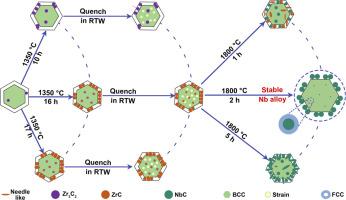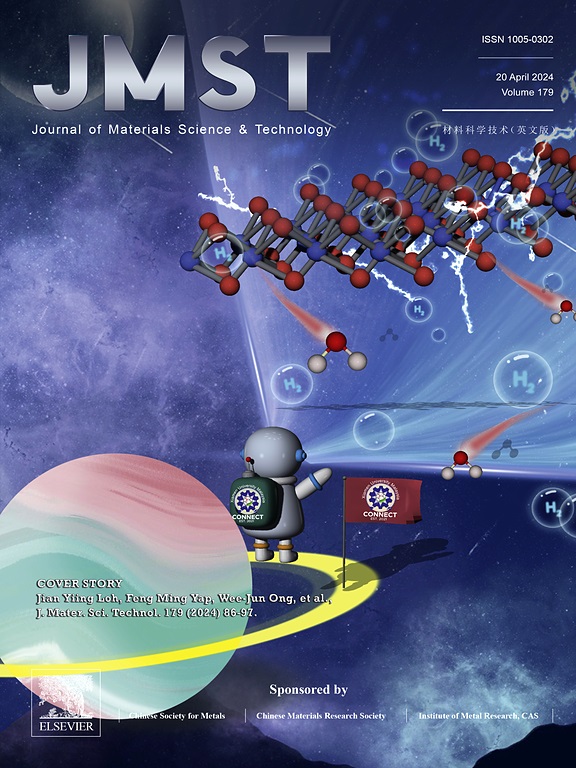用于高温应用的具有分层碳化物结构的高性能铌合金
IF 11.2
1区 材料科学
Q1 MATERIALS SCIENCE, MULTIDISCIPLINARY
引用次数: 0
摘要
在航空航天领域,BBC-Nb 合金在不同温度循环疲劳下的热稳定性和韧性方面面临着显著挑战。热稳定性不足和析出物加速凝聚大大加速了合金在高温下的降解。在此,我们通过理论计算和两步分级热处理工艺,设计出了一种具有出色热稳定性和机械性能的铌合金。该铌合金的优异性能主要与 NbC 分层结构有关,即 Nb-BCC 晶粒中的稳定纳米颗粒和晶界 (GB) 上的不连续微颗粒。分层碳化物结构避免了碳化物在 GB 处的连续沉淀和晶粒内部的优先粗化。该工艺包括在 1350 °C 下析出 ZrC 纳米颗粒,然后在 1800 °C 下通过用 Nb 取代 Zr 来稳定 NbC。包裹 NbC 的 Nb-FCC 纳米相可以防止粗化,并与 NbC 纳米颗粒和基体有着密切的关系。微调晶粒内的铌碳析出,并通过替代方法在 GB 处引入铌碳的概念为高强度耐热材料提供了一种策略。本文章由计算机程序翻译,如有差异,请以英文原文为准。

High-performance Nb alloy featuring a hierarchical carbides configuration for elevated-temperature applications
In aerospace, BBC-Nb alloys confront notable challenges in thermal stability and toughness under cyclic fatigue at varying temperatures. Insufficient thermal stability and expedited coalescence of precipitates substantially accelerates the degradation of alloys at elevated temperatures. Here, a Nb alloy with impressive thermal stability and mechanical properties was designed using theoretical calculations and a two-step graded heat treatment process. The superlative properties of the Nb alloy are primarily associated with the NbC hierarchical structures, i.e., stable nanoparticles in Nb-BCC grains and discontinuous microparticles at grain boundaries (GBs). The hierarchical carbides configuration avoids continuous precipitation of carbides at GBs and preferential coarsening within the grains. The process involves precipitating ZrC nanoparticles at 1350 °C, then stabilizing NbC at 1800 °C by replacing Zr with Nb. Nb-FCC nanophases enveloping NbC prevent coarsening and have strong relationships with both NbC nanoparticles and matrix. The concept of fine-tuning NbC precipitation within grains and introducing NbC at GBs with a substitution method offers a strategy for high-strength, heat-resistant materials.
求助全文
通过发布文献求助,成功后即可免费获取论文全文。
去求助
来源期刊

Journal of Materials Science & Technology
工程技术-材料科学:综合
CiteScore
20.00
自引率
11.00%
发文量
995
审稿时长
13 days
期刊介绍:
Journal of Materials Science & Technology strives to promote global collaboration in the field of materials science and technology. It primarily publishes original research papers, invited review articles, letters, research notes, and summaries of scientific achievements. The journal covers a wide range of materials science and technology topics, including metallic materials, inorganic nonmetallic materials, and composite materials.
 求助内容:
求助内容: 应助结果提醒方式:
应助结果提醒方式:


